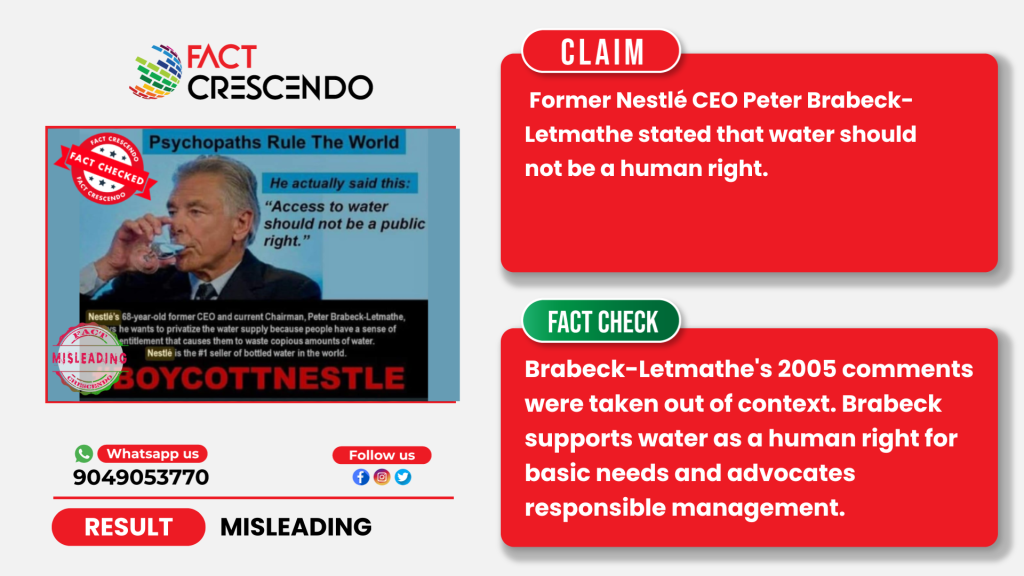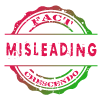
For years, a controversial claim has circulated online, alleging that Peter Brabeck-Letmathe, former CEO of Nestlé, declared water should not be a human right. This assertion has ignited backlash against Nestlé and raised concerns about corporate control over water resources. The quote attributed to Brabeck has sparked debates on whether water should be considered a fundamental human right or a commodity.
Social Media Posts
We found that the claim about Brabeck, former CEO of Nestlé, stating that “The access to water should not be a public right” has been circulating for years and continues to spread. The claim has gone viral on multiple platforms.
Fact-Check
The controversy surrounding Peter Brabeck-Letmathe’s views on water as a human right originated from a 2005 documentary, We Feed the World. In this film, Brabeck discussed water management and the challenges of balancing resource use with sustainability. His statements, including the controversial quote, “The one opinion, which I think is extreme, is represented by the NGOs, who bang on about declaring water a public right. That means that as a human being you should have a right to water. That’s an extreme solution,” were interpreted by some as advocating for water privatization, leading to public debate. Brabeck’s comments addressed responsible water resource management and the importance of valuing water to prevent waste, especially in water-scarce areas. He emphasized the need to meet basic human needs while also managing water as an essential resource that requires regulation and careful use.
Watch the video here:
In 2011, Brabeck addressed the controversy in a video titled “Water is a Human Right.” He clarified his position, stating that water for basic human needs is a human right. Brabeck emphasized that everyone should have access to 50-100 liters of clean, safe water daily for fundamental needs, while distinguishing this from non-essential uses.
Brabeck discussed water scarcity, projecting that by 2025, 1.8 billion people will live in water-scarce regions. He advocated for better management, valuation, and preservation of water resources, suggesting that assigning value to water could improve supply management.
The chairman noted that agriculture consumes up to 90% of fresh water. He mentioned Nestlé’s efforts to reduce water usage in its factories and its collaboration with others on water conservation. Brabeck concluded by acknowledging water as a priority issue and thanking viewers for their engagement in the discussion.
Nestlé has since clarified Brabeck’s position in an official statement. The company emphasized that Brabeck supports access to clean water for basic needs as a human right, while advocating for responsible water management. This includes distinguishing between essential water needs and other uses like irrigation or industrial applications to prevent waste, especially in water-scarce regions. Read the statement from Nestlé here.
Nestlé’s Water Management Practices
Currently, Nestlé’s water sustainability initiatives focus on responsible management, conservation, and community support. The company emphasizes reducing water use in operations, protecting water sources, and replenishing watersheds. Nestlé collaborates with local communities and organizations to improve access to clean water, sanitation, and hygiene. Its programs aim to preserve water resources and address global water challenges through innovation, policy support, and partnerships. Read more about this here.
Summary
The claim that former Nestlé CEO Peter Brabeck-Letmathe believes water should not be a human right is misleading when taken out of context. His comments from a 2005 documentary focused on responsible water management rather than opposing water rights. Brabeck has since clarified that access to water for basic human needs is indeed a right. Nestlé has also reinforced his position, emphasizing support for clean water access as a human right while advocating for better resource management, especially in water-scarce regions.

Title:Nestlé’s Ex-CEO on Water Rights: Misunderstood Comments Clarified
Fact Check By: Cielito WangResult: Misleading


